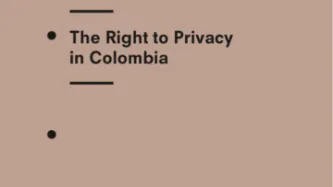Search
Content type: Advocacy
Este informe es presentado por Derechos Digitales, Ciudadano Inteligente, Fundación ProAcceso y Privacy International. Derechos Digitales es una organización no gubernamental de defensa, promoción y desarrollo de los derechos humanos en el entorno digital. Ciudadano Inteligente es una organización dedicada a fortalecer la democracia y reducir la desigualdad a través de la transparencia y la participación ciudadana. Fundación ProAcceso se dedica a la defensa del derecho de acceso a la…
Content type: Advocacy
This stakeholder report is a submission by Dejusticia, Fundación Karisma and Privacy International (PI). Dejusticia is a Colombian human rights organization that provides expert knowledge on human rights. Fundación Karisma is a Colombian civil society organization that seeks to respond to the opportunities and threats that arise in the context of ‘technology for development’ for the exercise of human rights. PI is a human rights organisation that works to advance and promote the right to…
Content type: Explainer
Phone networks are divided between two networks: the physical and the mobile. The physical runs on the Public Switched Telephone Network (PSTN) that serves your home phone. Mobile networks are dominant in the age of communication and are used to relay mobile communications to the PSTN. The most prominent mobile networks are GSM networks (Global System for Mobile communications) and are what we use everyday to communicate with one another. Another system is known as CDMA (Code Division Multiple…
Content type: News & Analysis
The Privacy International Network recently submitted joint stakeholder reports for seven partner countries - India, South Africa, Morocco, Tunisia, Brazil, the Philippines and Indonesia - as part of the 27th session of the Universal Periodic Review (1 to 12 May 2017).
Communications surveillance was a major area of concern, as we observed that these policies and practices remain largely opaque, complex and vague. In…



